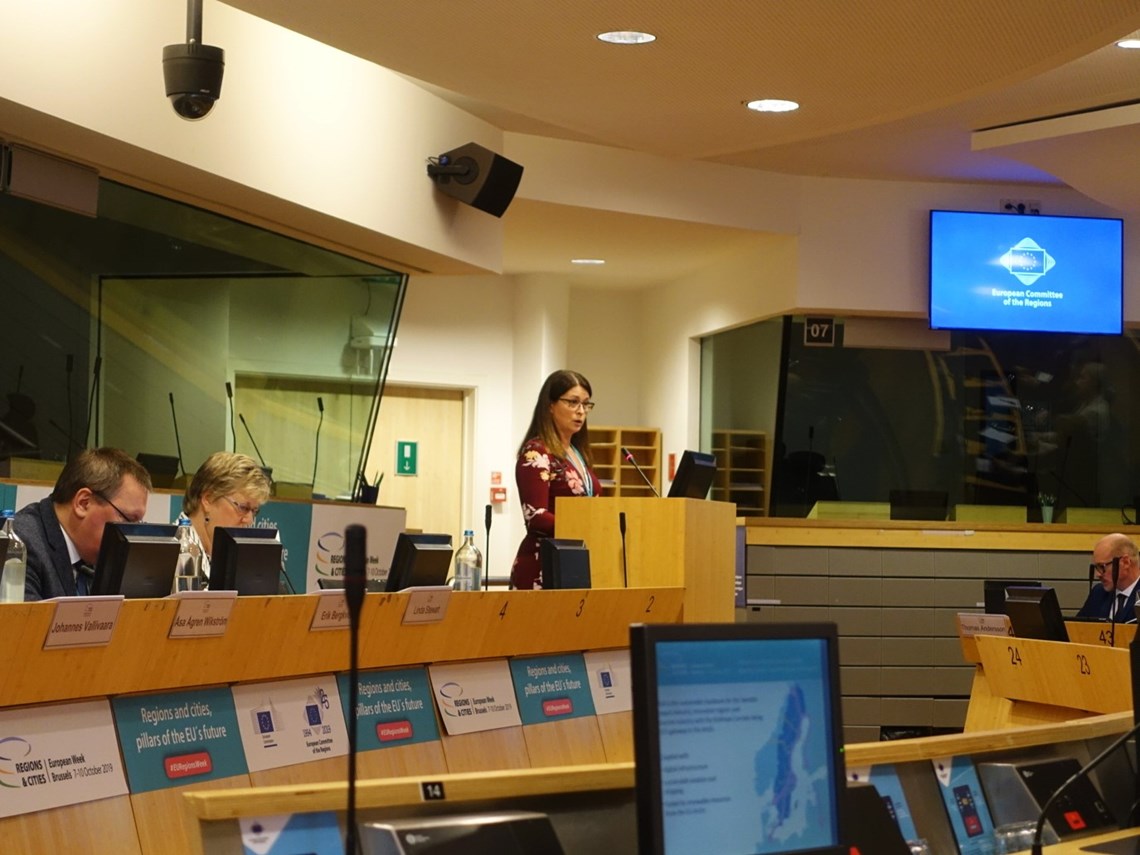Renewable energy transition in sparsely populated areas

For the fourth consecutive year, North Sweden and Mid Sweden together with the other Brussels offices in the Northern Sparsely Population Areas, NSPA, together with Scotland House organized an event during the European Week of Regions and Cities, EWRC. Under the theme "Transition of renewable energy in sparsely populated areas", successful regional projects in renewable energy were presented. In addition, discussions were held on the possibilities for green energy conversion in the EU's northernmost regions.
Great interest in this year's seminar
At this year's seminar at the Committee of the Regions on October 8, there was a great interest with over 100 registered participants. The panelists were representatives from academia, business, local and regional level, and the European Parliament. The seminar was started with a welcome word by Thomas Andersson, chairman of the regional council in the Härjedalen Jämtland region and a board member of the Mid Sweden European Office Ownership Council. The moderator of the seminar was Linda Stewart from The University of Highlands and Islands.
Leading green projects and sparsely populated regions' potential on the agenda
The first speaker was European Parliamentarian Erik Bergkvist who gave an introduction to the subject. Erik Bergkvist emphasized the importance of individuals and politicians at the local, regional, national, and EU level widening their views and realizing the opportunities that exist for development in the northern sparsely populated areas, not least when it comes to green energy conversion. With a quote, Bergkvist illustrated the ambition to invite a different approach to the northern regions.
“We are not a museum, people do not want to live in a museum. But we are also not a pantry where people can come and pick what raw materials they want ”, Bergkvist said.
Åsa Ågren Wikström, Vice Chairman of the Regional Development Committee of the Region Västerbotten as well as a member of the Committee of the Regions, continued on the same theme by showing on several projects in the Region Västerbotten that, with the help of EU funds, contribute to a more sustainable energy transition. Ågren Wikström emphasized the importance of cross-border cooperation and talked about EU projects such as "Midway Alignment - a ferry between Vaasa and Umeå" and the "Bottniska Corridor".
Johannes Vallivaara, CEO of ProAgria Lapland, which is a corporate cluster in northern Finland, presented how the cluster model ProAgria can help with stable regional development in the northernmost regions. In particular, Vallivaara emphasized the importance of regional and local cooperation in solving the challenges that the northern regions have, for example, with a large capital outflow through high energy consumption.
Gary Campbell from the University of Highlands and Islands talked about an ongoing research project in sustainable flight. Through collaborations between business, academia and the public sector, research is conducted with the aim of producing battery-powered aircraft for a small number of passengers on short distances. The results are promising and the hope is to be able to scale up the project in the near future and enable sustainable flights at a fraction of the current cost in the near future.
Jørgen Holten Jørgensen, head of operations at Berlevåg municipality in northern Norway presented Berlevåg's investments in wind power. In addition to increasing the number of wind turbines, the investment involves new opportunities to store the surplus energy from the hydrogen plants. Hydrogen can have several uses and in the future, it is possible that it can be used both in the vehicle fleet and in industry.

Multi-faceted discussion ended the session
In subsequent discussions, the focus was on solutions to the challenges that characterize the EU's northernmost regions mostly in terms of infrastructure and demographics. The disadvantages of the regions were also highlighted as potential benefits, and several of the speakers felt that both the EU and local residents recognize this. One example is the opportunity for regions in a cold and harsh climate to act as a test bed for the rest of Europe in various innovative sectors where products must be tested. Other advantages in this area are the large space and the foundation for business and research. Innovation and ingenuity are not lacking but, on the contrary, the regions are at the forefront and are among the EU's most innovative regions in certain areas. Renewable energy conversion can take place to a greater extent in the EU's northernmost regions thanks to further cooperation, increased political hearing at various levels and continued financial support.
Watch the webcast from the seminar here.
/Oskar Helsing
